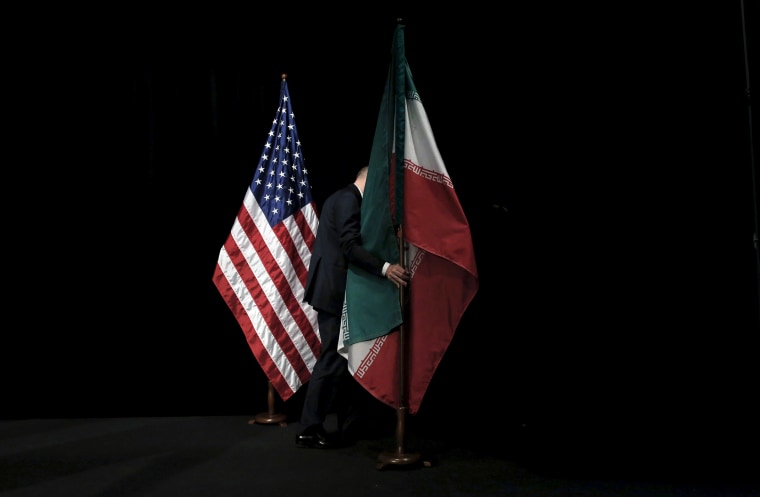One of the major criticisms of the nuclear deal with Iran is that lifting economic sanctions will strengthen Iran’s ability to support terrorist groups and other activities that destabilize the Middle East. And it's a real concern: Just last month, Iranian Supreme Leader Ali Khameni gave a speech pledging steadfast support for Iran's proxies across the Middle East.
But making a deal with Iran doesn't mean giving up on our commitment to combating terrorism. By combining a smart, tough strategy of military, economic and diplomatic pressure, the United States can continue constraining Iran's illicit activities even as we implement an agreement that curbs their nuclear threat.
Military
First, the U.S. needs to maintain a robust military posture to strengthen the relative military advantage of our allies in the Middle East and to deter and interdict Iran’s efforts to send arms and ammunition to its proxies. The Obama administration has already begun to take steps to bolster the security of key Persian Gulf countries, including stepping up military and intelligence cooperation with Saudi Arabia and other members of the Gulf Cooperation Council, identifying mechanisms to strengthen regional missile defense capabilities, and authorizing increased military sales that will deter Iranian aggression. The U.S. can also use our naval presence in the region to turn back Iran’s efforts to resupply its allies, as the U.S. Navy earlier this year successfully deterred an Iranian shipment thought to be headed to resupply Iranian-backed rebels in Yemen.
Economic
Second, even with the nuclear agreement, the U.S. should deploy key economic tools against Iran’s financial support for terrorism—and the Obama administration should publicly describe its strategy to keep up to enforcement of the sanctions that remain in force despite the nuclear agreement.
The nuclear deal will result in the termination of most of the broad macroeconomic sanctions on Iran, giving Iran access to frozen assets, permitting it to increase its oil sales, and enabling international business to reenter the Iranian market. The simple fact is that given years of sanctions-induced economic decline and the expectations of the Iranian people, Iran will likely use a large share of this relief to make domestic investments and to provide benefits to the Iranian people. But any increase in Iran’s financial support for terrorism poses an unacceptable threat to the U.S. and our allies and must be fought aggressively.
The nuclear agreement commits the U.S. and our allies to not simply re-impose economic sanctions suspended in exchange for Iran meeting nuclear commitments, and doing so could jeopardize the deal itself. But consistent with the nuclear agreement, the U.S. can and should maintain a robust campaign to target specific companies and specific actions that facilitate illicit Iranian activities.
RELATED: How to bankrupt the Islamic State
Fortunately, the U.S. has financial tools to keep up pressure on Iran’s illicit activities. American officials can begin by making clear that they will sanction any companies or banks that that facilitate Iran’s support for terrorism or other destabilizing activities -- including companies that are delisted as part of the nuclear agreement. Businessmen and bankers in Iran need to understand that if their companies facilitate Iran’s continuing illicit activities, they will again be shut out of Western markets.
The U.S. is also keeping in place Iran’s designation as a “jurisdiction of primary money laundering concern” under Section 311 of the Patriot Act, which imposes heightened due diligence standards on banks connecting with Iran to ensure that they do not facilitate illicit financial activities. U.S. regulators should aggressively engage with international banks to discuss the steps that banks should take to ensure that they do not inadvertently facilitate ongoing illicit financial activities.
Diplomatic
Third, the U.S. needs to pursue an aggressive strategy of promoting political and social reform in Iran. When the nuclear agreement begins to expire, Iran will be able to move closer to the nuclear threshold -- and the U.S. has a keen interest in seeing political reforms occur in Iran before that day arrives. Given Iran’s domestic crackdown on dissent, however, political reform is unlikely to happen on its own. The U.S. should help promote reform in Iran by capitalizing on the nuclear deal to facilitate greater engagement by U.S. and international NGOs and civil society organizations in Iran and by continuing to stand up for activists in Iran who run great personal risks to seek political reforms in their country.
RELATED: Obama defends comparing Republicans to Iranian hardliners
There are many reasons to doubt that the Iranian government, which has a record of decades of supporting illicit activities, will readily curb its aid to groups that threaten the U.S. and our allies. But an effective, multi-faceted strategy will let the U.S. keep up the pressure on these activities and fight back against Iran’s regional ambitions even as we implement a nuclear agreement that offers the best chance of peacefully constraining Iran’s nuclear program.
Peter Harrell is an Adjunct Senior Fellow with the Center for a New American Security and the former Deputy Assistant Secretary of State for Counter Threat Finance and Sanctions.
